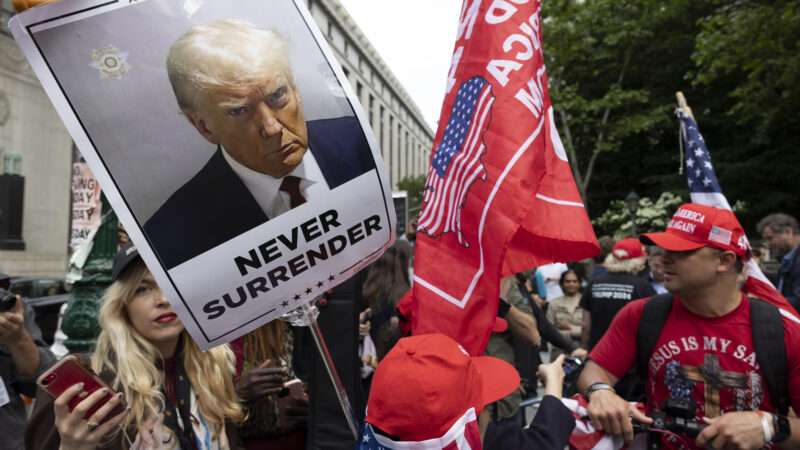
As a general rule in politics and public policy, I'd suggest applying one's principles as consistently as possible. It's hard to be taken seriously if, say, you want the feds to prosecute your political opponents on some ill-defined charges—and then complain about the "weaponization" of the justice system when you or your allies are in the dock. Just saying.
One of my oft-stated warnings for those, on the Left or Right, who advocate for new laws, more regulation, and broader powers for police agencies: First consider how these powers might be wielded in the hands of your enemies. Many "well-intentioned" laws have been twisted in ways that the authors never envisioned. Sometimes the reasons are nefarious, other times the result of bureaucratic inertia.
During the 1980s War on Drugs, the U.S. Department of Justice created civil asset forfeiture laws that empowered the government to grab the property of drug cartels. It quickly became a means for police agencies to steal cars and cash from ordinary Americans, many of whom had never been convicted of or accused of a crime. The criminal justice reform movement has been trying to reform those and other unjust laws for years, but governments are amazingly resistant to change.
But perhaps that movement is ready to welcome a large group of Americans who previously had shown little interest in the inner workings of the justice system. Now that former President Donald Trump is a convicted felon—and faces other state and federal charges in a variety of prosecutions—the Make America Great Again movement has suddenly discovered the evils of politicized prosecutions, inequities in the justice system, and fear of police abuse. MAGA hasn't gotten the requisite takeaways yet, so I'm spelling it out for them.
Before Trump showed up on the political scene, the nation was heading toward a new consensus about the criminal justice system. The forfeiture issue had become a bipartisan concern given its abuses. Liberal groups had long complained about police abuse, but prominent conservatives also came to realize that bad policing costs taxpayers a lot of money and undermines good policing. Incarceration levels and costs soared, which provided impetus for change.
However, Trump's 2016 election polarized the electorate. The excesses of Black Lives Matter and "defund the police" hardened the battle lines, especially after protests and riots following George Floyd's death in Minneapolis. COVID-19 struck and crime rates increased. Conservatives went all in on "backing the badge." We found ourselves in the same old place, with little room for bipartisan anything.
Trump made matters worse with his rhetoric. There was the time he joked to a crowd of police officers that they shouldn't protect suspects' heads when putting them in squad cars. He denies it now, but Trump seemed to encourage crowds to chant "lock her up" referring to Hillary Clinton. It's hard to keep track of the number of officials MAGA supporters have wanted to lock up, with U.S. Rep. Marjorie Taylor Greene's (R–Ga.) comments to Anthony Fauci the latest example.
The Mueller report "shows Mr. Trump trying to wield the power of law enforcement to target a political rival, a step that no president since Richard M. Nixon is known to have taken," The New York Times summarized. But that was then and this is now. With Trump feeling the sting of a jury (albeit after a local prosecution rather than a federal one) maybe his minions will rethink their inconsistency. Hope springs eternal.
The antidote to an allegedly political prosecution is to limit the ability of prosecutors to take novel and politicized readings of relevant statutes. The goal is to reduce their power so they can't do this to anyone, but Trump and his supporters just don't want it happening to them.
"Time for Red State AGs and DAs to get busy," posted U.S. Rep. Mike Collins (R–Ga.) on X, per an ABC News report. It pointed to other Trump supporters, including conservative commentator Charlie Kirk who called on Republicans to "indict the left" and Donald Trump Jr., who called on Republicans to "fight fire with fire." It's almost as if they only care about justice when they are on the receiving end of it.
A recent Reason column lamented the dissipation of justice reform in some Red States: "Claiming to be responding to rising crime and the excesses of progressive reformers, several Republican-controlled state legislatures have not only reversed progress but also rolled back key reforms: increasing prison sentences, limiting parole and probation, restricting charities that pay bail for offenders, curtailing the discretion of local district attorneys and gutting civilian police oversight boards."
So, granted, there's no evidence whatsoever that Trump and MAGA want to reform the justice system and consistently address their concerns about the Trump prosecution. They seek revenge following the travails of their Dear Leader. But there's always time to learn the right lessons. When they do, I'll be the first one to welcome them into the criminal justice reform fold.
This column was first published in The Orange County Register.
The post Republicans Upset by Trump's Conviction Should Embrace Criminal Justice Reform appeared first on Reason.com.







